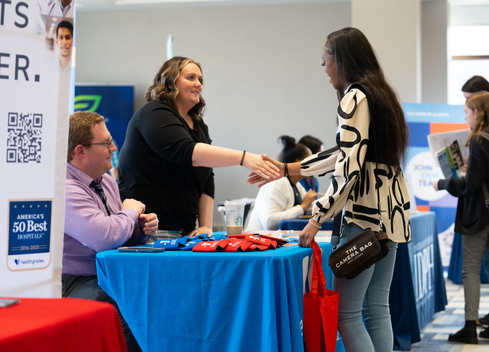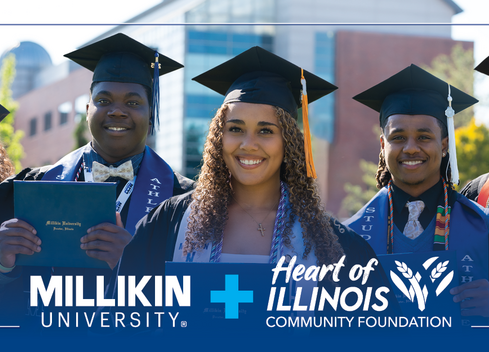The Power of Performance Learning
Millikin’s Signature Brand of Education Empowers Academic Excellence
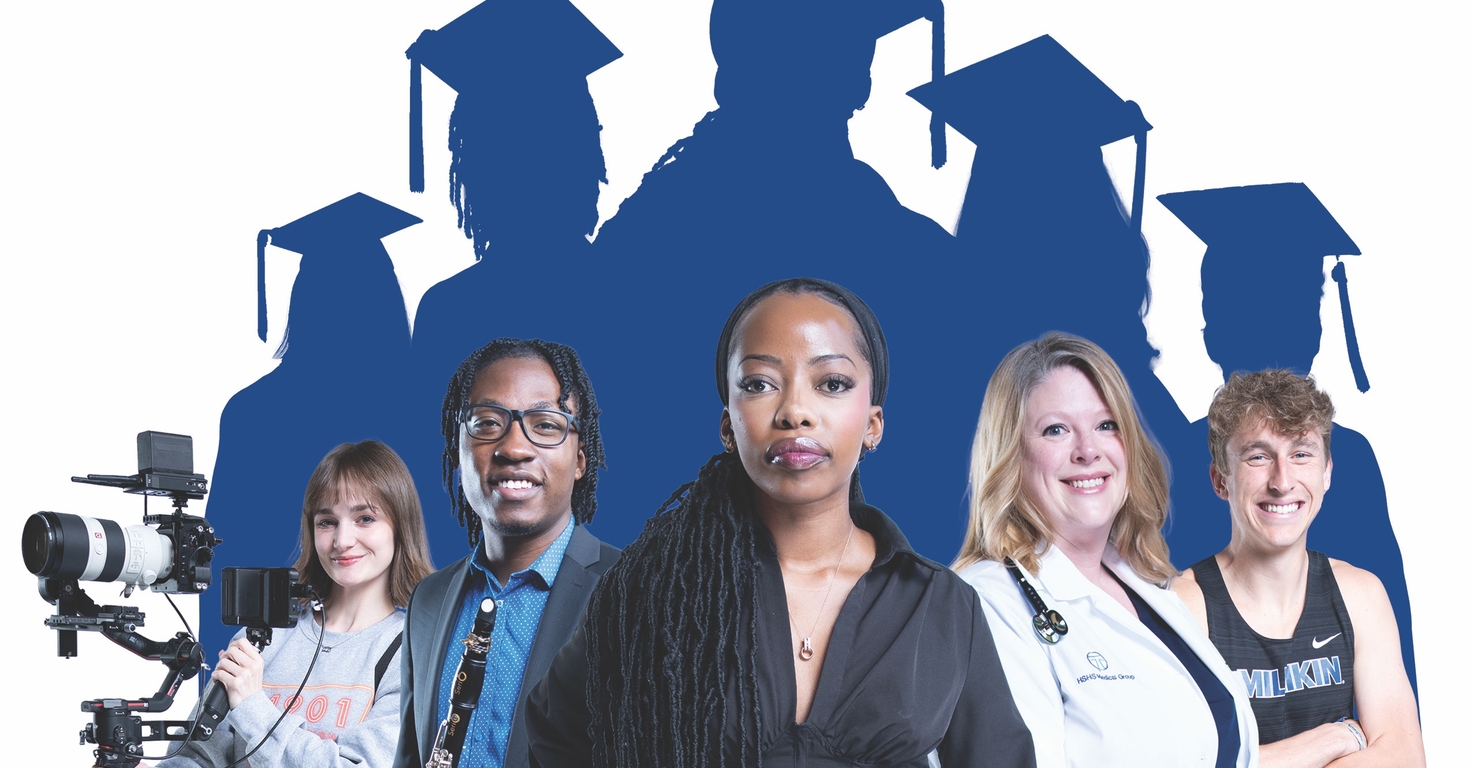
-
An MBA student from Rwanda helps a retired police lieutenant in Macon County conduct ground-breaking domestic violence research.
A member of the Women’s Triathlon team fills backpacks with food for area schoolchildren who might otherwise go hungry.
A Nursing major transfers from a local community college and uses cutting-edge simulation technology to master the skills that will improve the health of her community.
A Biology major tests birds of prey to find answers about how infectious diseases jump from animals to humans.
What do they have in common? The power of Performance Learning. At Millikin, academic excellence is driven by Performance Learning, Millikin’s signature brand of education. But what does Performance Learning really mean? Millikin Provost Mary Black offers a succinct, and incisive, definition:
-
- At Millikin, Performance Learning isn’t just learning by doing, but learning by doing that involves real risk and real reward — our students engage in educational experiences with stakes in the real world.
— Mary Black , Millikin Provost -
At every level of their education, Millikin students partner with third-party stakeholders in industry, academia and government to find innovative solutions that will improve the quality of life in their communities.
This is the academic excellence that Millikin advances every day, where faculty and staff mentor students as they engage in life-changing educational experiences. It is why Millikin students graduate to become the next generation of industry leaders, problem-solvers and change-makers.
Here are a few of their stories.
-
Domestic Violence Research
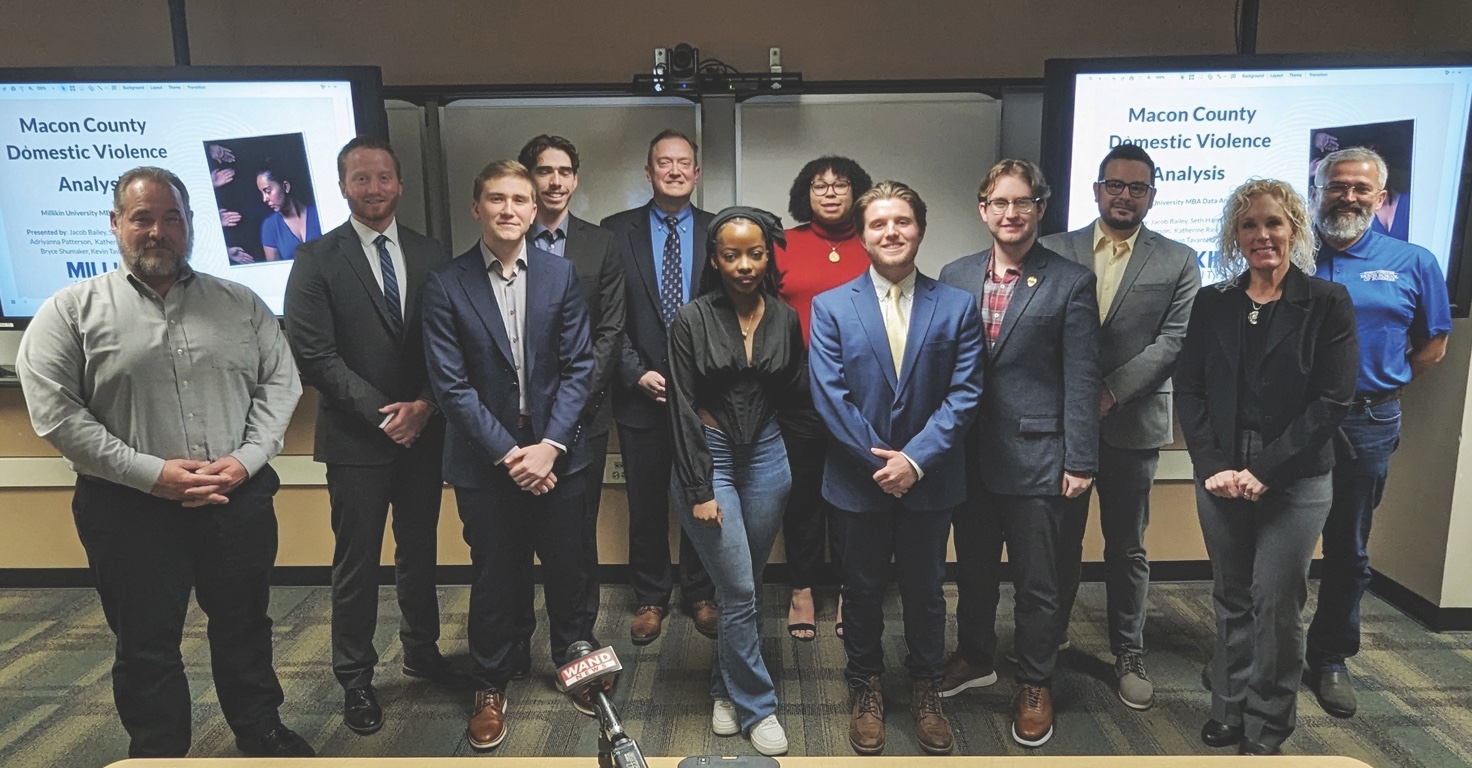
When retired Decatur Police Lieutenant Shannon Gutierrez Seal needed assistance developing a system to analyze domestic violence statistics in Macon County, she turned to Millikin University’s Tabor School of Business.
Gutierrez Seal reached out to Jaclyn Weisenborn Cantwell, Class of 2009, and Director of the MBA Program, and Cantwell saw that opportunity as the perfect Performance Learning project for the MBA Data Analytics students.
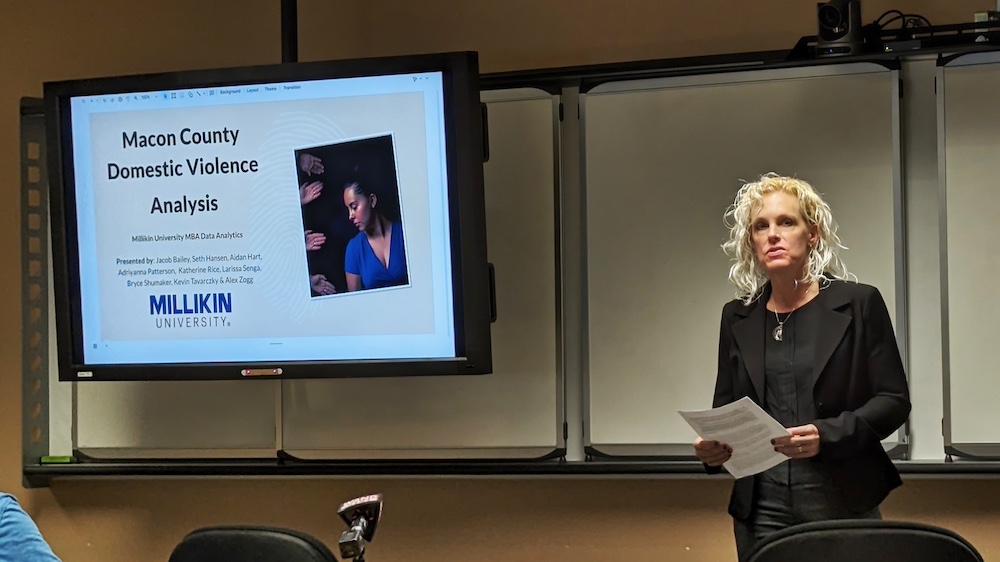
Students started by developing their skills in Data Mining, and continued in Data Visualization and Business Forecasting classes taught by Millikin Tabor School of Business faculty Jason Sexton, James Wilkerson and Brian Stenke. These collective skills were critical to the project and its goal to give a complete picture of domestic violence statistics in Macon County for 2023.
“You can think of it as a giant funnel of information. There are police calls for service from all nine police agencies in Macon County. What were their responses to domestic violence crimes? Was there a report? Was it founded or was it unfounded? Was there an arrest? Once an arrest is made, were the state’s attorneys charging it or not charging? If they are not charging it, then it disappears. If they charge it, it goes on to the circuit clerk, and we follow it through the judicial process,” Gutierrez Seal said.
Compiling and interpreting that data was complicated and required gathering information from several state and local agencies.
“Each entity keeps its own data, but they don’t communicate to the circuit clerks, and the codes they use between the agencies are not the same. A police report number has nothing to do with the number a circuit clerk assigns to a criminal court case,” Gutierrez Seal said. “Connecting those is a real hassle. You have to put physical pieces of paper together and draw the lines. At this point, there is no software or connection IT-wise to make all of these things flow.
“This is the only study like this in Illinois and probably the nation, as far as we can tell. The state of Illinois tracks the law enforcement’s involvement with domestic violence, and it stops there. It has never gone beyond that.”
The students presented their findings to representatives of Dove, Inc., a local nonprofit social service organization; members of the Decatur Police Department and State’s Attorney’s Office; and Tabor School of Business faculty. The presenters included Millikin students Jacob Bailey ’23, Seth Hansen ’21, Aidan Hart ’23, Adriyanna Patterson ’23, Larissa Senga ’23, Bryce Shumaker ’23, Kevin Tavarczky ’14 and Alex Zogg ’23.
They found that, from January through November 2023, Macon County accounted for 5% of all domestic violence calls in Illinois. Of those calls, 46% occurred after 4 p.m. each day, and the peak call month was June. They found that 81% of Macon County domestic violence offenders are male and 19% are female, compared nationally to 90% male offenders and 10% female.
“We got this project on our very first day of class, and we didn’t realize at first how important this project would be to us and the community. We were tasked with creating a metric system along with visualizations and a lot of data, and there was a lot of hard work and some grueling nights,” said Millikin Criminal Justice undergraduate Adriyanna Patterson. “This experience has been so rewarding. I was expecting to do some experiments and play with some numbers, but this project is real-world stuff about a serious topic.”
-
Big Blue Backpacks
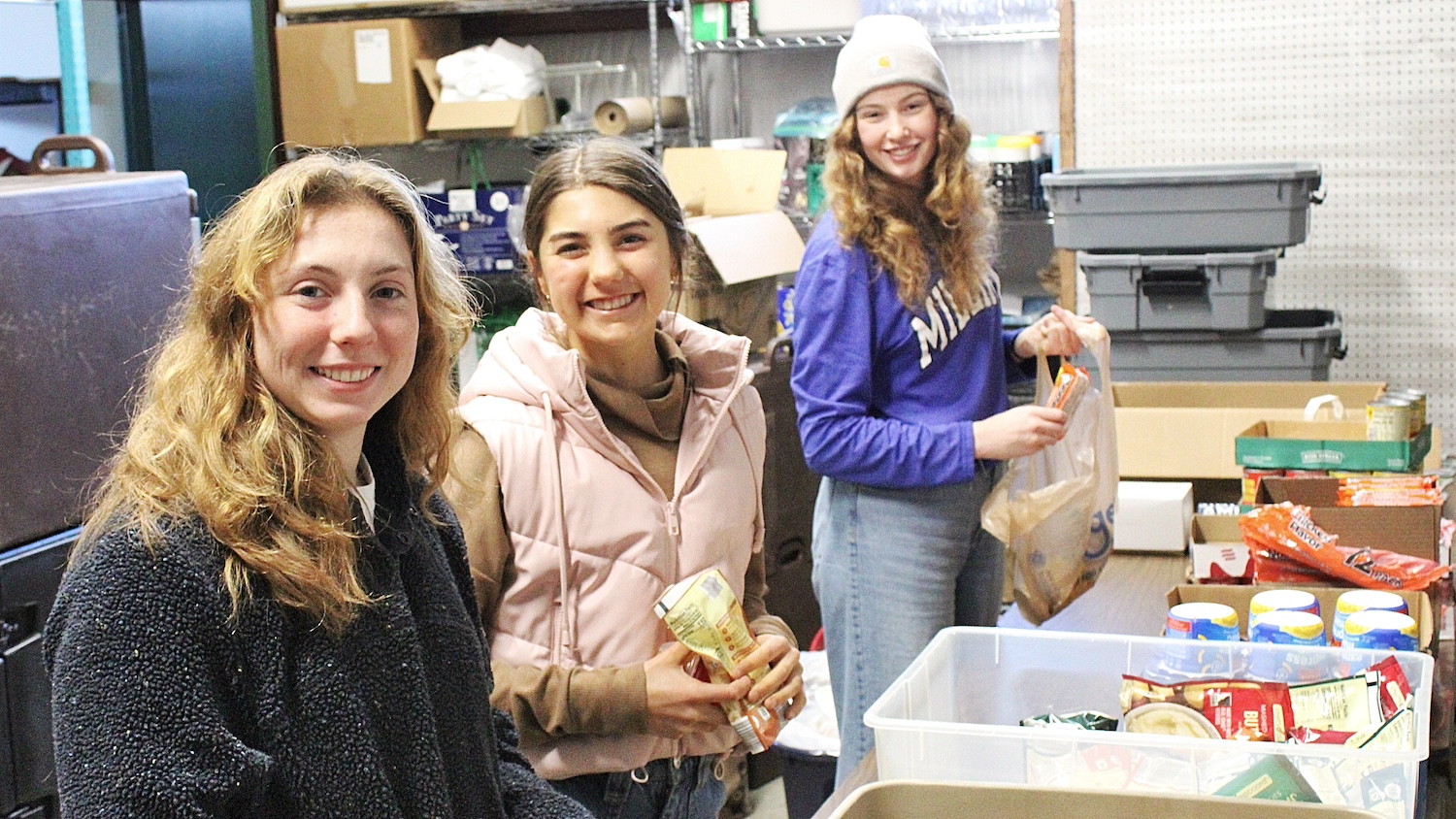
The good work that Millikin University’s Big Blue Backpacks (BBB) does is often done in the background, out of the spotlight.
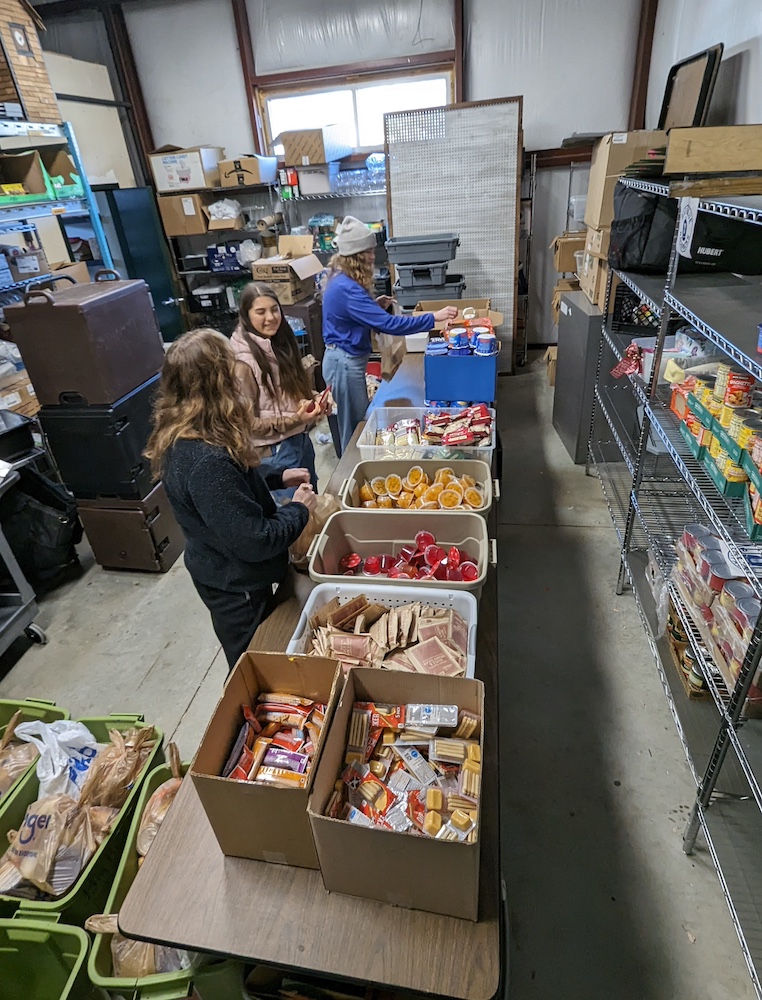 The student-run organization that addresses food insecurity for Decatur Public School (DPS) students provides weekend meals for 125 total students at Decatur’s Dennis Lab School, American Dreamer STEM Academy and Michael E. Baum Elementary. While the work that BBB Co-Chairs Aly Barnes and Kendall Rossignol and BBB member Kendra Culler do isn’t flashy — ordering, organizing and preparing food for students — the impact is tremendous.
The student-run organization that addresses food insecurity for Decatur Public School (DPS) students provides weekend meals for 125 total students at Decatur’s Dennis Lab School, American Dreamer STEM Academy and Michael E. Baum Elementary. While the work that BBB Co-Chairs Aly Barnes and Kendall Rossignol and BBB member Kendra Culler do isn’t flashy — ordering, organizing and preparing food for students — the impact is tremendous.The group, which partners with Decatur’s Good Samaritan Inn, meets on Tuesday mornings at Good Samaritan to prepare the food bags, which are distributed to youth in time for the weekend. After serving Dennis Labs and American Dreamer for several years, Michael E. Baum Elementary was recently added to the BBB program. The students receiving the bags haven’t met the college students who provided them.
“We know the students are very appreciative, but we are kind of undercover, and that is how it is supposed to be,” Barnes said. “It feels good to be contacted by another school that would greatly benefit from 20-25 bags. I’m happy that we have the capacity to do that and that we can provide this for the people in need.”
Barnes and Rossignol, members of the Millikin Swim and Triathlon teams, typically prepare the weekly order from Decatur’s ALDI grocery store, pick it up, organize it and prepare it for an assembly line process. The BBB program, which runs during the academic year, has menus that vary slightly from week to week. The bags typically include granola bars, mac ‘n’ cheese, soup, canned pasta, fruit cups/snacks and oatmeal.
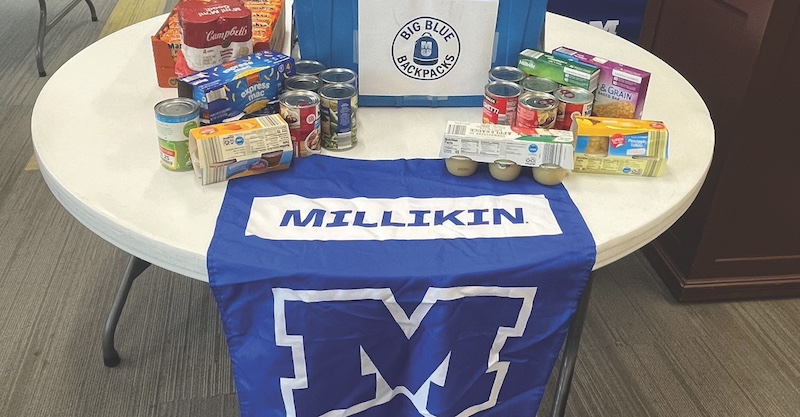 “Around Halloween and Christmas, we will get candy and candy canes to add to the bags for something fun. Before summer break, we do a double order,” Rossignol said. “Good Samaritan will also give us extra donations that they receive. They recently gave us 300 jars of peanut butter, so we gave everyone a jar plus 20 meals for the summer. We try to do that when there will be a long break.”
“Around Halloween and Christmas, we will get candy and candy canes to add to the bags for something fun. Before summer break, we do a double order,” Rossignol said. “Good Samaritan will also give us extra donations that they receive. They recently gave us 300 jars of peanut butter, so we gave everyone a jar plus 20 meals for the summer. We try to do that when there will be a long break.”With increased funding, the group has many ideas for expanding, including continuing to add other DPS schools, adding more fresh produce and perishable items and developing a system where students can pick out what they receive in their bags.
-
Campbell Family Nursing Simulation Center
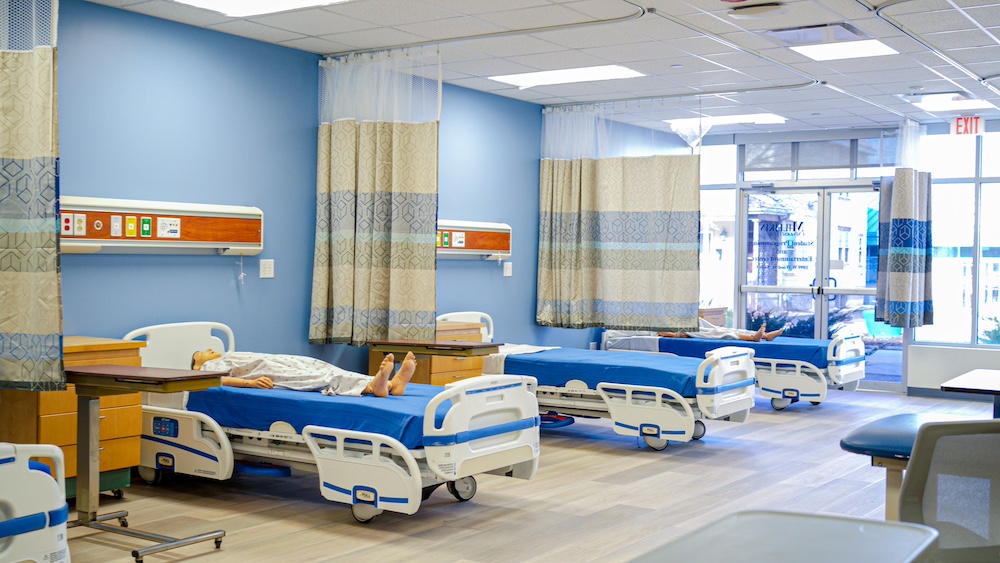
With construction completed on the Health Sciences Center and Health Sciences West, Millikin’s School of Nursing moved into a new home this spring.
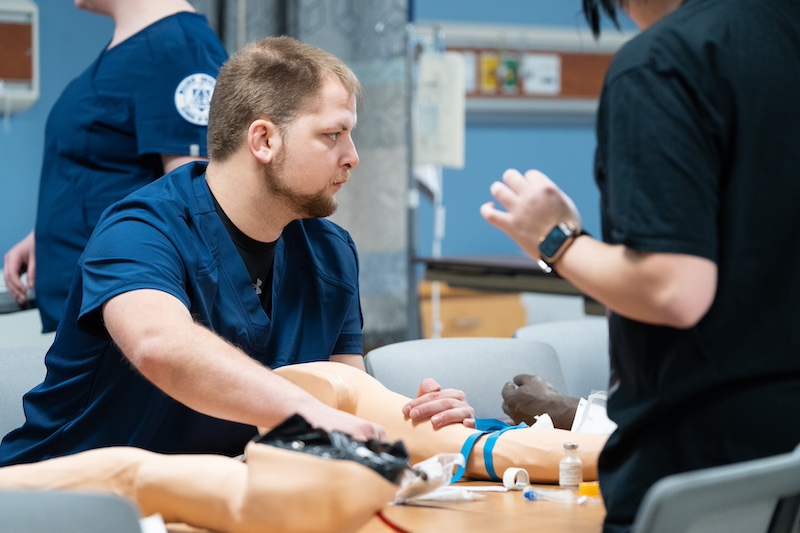 “The School of Nursing has three spaces. Within the Health Sciences Center’s first floor is our simulation area and on the second floor, across from the School of Exercise Science and Sport, is our administration office,” Millikin Interim Director of Nursing Dr. Teresa Gulley said. “Across the street, what used to be the Millikin Institute is now Health Sciences West. We have three classrooms over there, as well as office spaces and a conference room."
“The School of Nursing has three spaces. Within the Health Sciences Center’s first floor is our simulation area and on the second floor, across from the School of Exercise Science and Sport, is our administration office,” Millikin Interim Director of Nursing Dr. Teresa Gulley said. “Across the street, what used to be the Millikin Institute is now Health Sciences West. We have three classrooms over there, as well as office spaces and a conference room." Four state-of-the-art simulation rooms are the centerpieces of the Campbell Family Nursing Simulation Center, thanks to a generous gift from Susan Ires Campbell, Class of 1968.
The rooms mimic a doctor’s office, obstetrics/pediatrics and hospital room settings. Control rooms with two-way mirrors allow instructors to monitor the simulation rooms and control what happens to the “patients," which are high-tech “simulator” mannequins.
“There are two big goals with simulation. One is learning some basic skills and thought processes before getting to real patients. You want to have that opportunity in a safe environment to learn and use your skills,” Gulley said. “The second one is high-risk, very intense scenarios that you may not get exposed to. We call them high-risk, low-volume scenarios. Those are excellent to do in this type of environment.”
Sophomore Nursing major Brittney Spalding already works in medicine as a Surgical Technologist at Carle BroMenn Medical Center in Normal. She transferred to Millikin from Richland Community College to expand her skills.
“The new space is amazing, and there is a lot of room for growth,” Spalding said. “I’ve loved everything about my experience here."
"We are so excited to be in a new space that highlights all of the awesome skills and lessons we’re able to teach to get the best experiences for our students,” Gulley said.
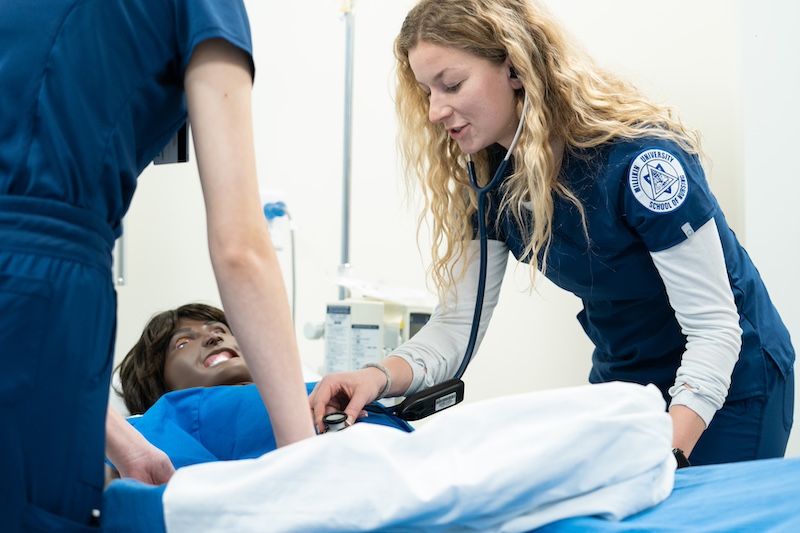
Millikin’s School of Nursing also announced a new Doctor of Nursing Practice (DNP) in Leadership program that began in January 2024. The program allows registered nurses holding a Master’s Degree in Nursing to achieve their goal of earning a Doctor of Nursing Practice. The DNP is a practice-focused doctorate similar in scope to practice doctorates offered in other professional disciplines.
-
Illinois Raptor Center
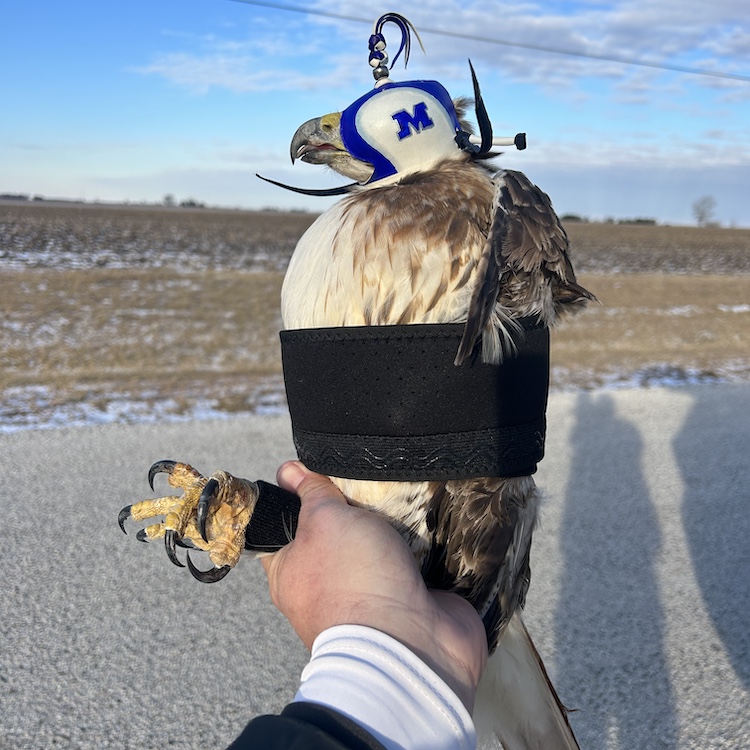
Millikin University recently celebrated the 10-year anniversary of its partnership with the Illinois Raptor Center (IRC), and according to Biology Professor Travis Wilcoxen, it’s a partnership that has never been more relevant.
“We live in a world where over 70 percent of all new diseases that show up in the human population come from a non-human source. And COVID-19, of course, is the quintessential example of this,” Dr. Wilcoxen said. “Where people all of a sudden started really caring about zoonotic diseases and where they were coming from — to better understand how the health of the human population is intrinsically linked to the health of wild animals.”
Zoonotic diseases are diseases that move from non-human animals to humans. Being able to quickly and accurately track that movement — especially in order to anticipate and fight outbreaks — is at the core of the work that Wilcoxen and his students do at the IRC.
“A lot of students working with me are going into human health careers. [Working with the IRC], they’ve become experts on a disease that exists in wildlife and can infect humans,” Wilcoxen said. “When they go to med school, or go on to do further research, they can already talk about how that disease works, where it comes from, how it’s spread and — most importantly — how to test for it.
“It’s what’s really powerful in teaching students this way: It has real implications for the birds, but it also has real implications for human health. And the techniques they’re learning they will use again and again, as a researcher, as a doctor.”
Millikin students gain hands-on experience in every step of IRC’s research, from catching birds that will be banded, tested and treated, to analyzing infectious disease samples from hundreds of birds to identify local patterns.
And the work of Wilcoxen and his students continues to expand into the community. Recently, Wilcoxen joined the Board of the Macon Mosquito Abatement District to provide research support that the District was lacking.
“The District has mosquito sampling protocols in place, but they’ve been struggling to access other insects that can spread disease.” Wilcoxen said. “At the Raptor Center, we not only do research related to birds of prey, we capture wild birds and sample them as well — last year we captured over 1,500 birds, including many who, for instance, carried ticks. The District had funding to collect and analyze ticks, but didn’t have the people to do it. By using samples we can provide, they’ll now be able to get a better idea of the risk of infection from tick bites in Macon County.”
Wilcoxen takes pride in the fact that these Performance Learning opportunities uniquely equip Millikin students to bring their skills to other communities and professions.
“Our students, entering the professional healthcare community, they don’t fall into that trap that others have in the past, which is thinking that humans exist in a bubble. They understand that the whole ecosystem matters,” Wilcoxen said. “Like with the COVID pandemic. If officials had been doing more surveillance of wild populations they would have realized, ‘Oh, we’ve seen this before. It’s present in these bats, and here’s all we already know about this virus.’
“Performance Learning has already given our students that mindset, those tools — it puts them ahead of the curve.”
